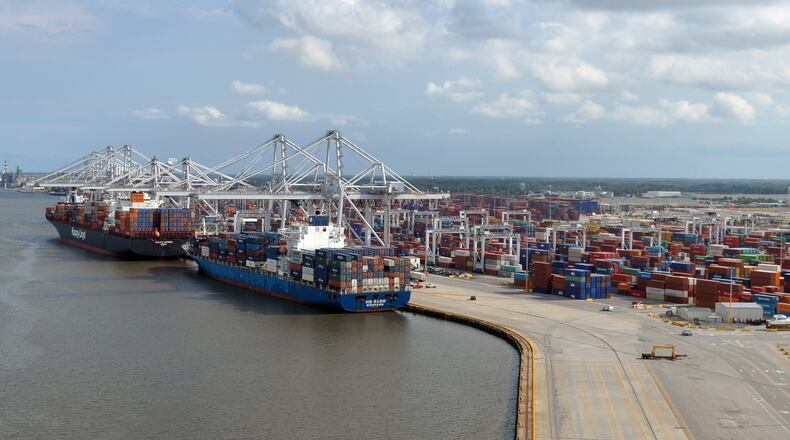Complete coverage
The Port of Savannah has a significant impact on jobs and the economy throughout the state of Georgia, and The Atlanta Journal-Constitution has reported thoroughly on the state’s efforts to deepen the harbor to handle larger ships.
To see video of staff writer Dan Chapman explaining the work that will stretch over 41 miles of the Savannah River in the coming years and why it is so important to Georgia’s economic development, go to MyAJC.com.
The long-awaited signing Wednesday of the agreement to start the dredging of Savannah’s port is not just a victory for the state’s top officeholders. It’s also a rare example of bipartisanship in Georgia’s political ranks.
The pact came together after 20 years of delays rooted in politics, environmental problems and regulatory issues. And it was welcomed by Gov. Nathan Deal and a host of politicians who each hailed the $706 million agreement as a sign that Democrats and Republicans can still work together.
“If there’s ever been a project in Georgia that is bipartisan,” Deal said, “this is it.”
It took an evolving coalition of politicians and bureaucrats who gelled over decades of work to seal the deal. They spanned from U.S. Rep. Jack Kingston, the Savannah Republican who was an early champion of the deepening, to Atlanta Mayor Kasim Reed, a Democrat who embraced it as his top economic development priority after his 2009 election.
“This is the most consequential infrastructure project since Hartsfield-Jackson,” a buoyant Reed said in an interview. “This is what I ran for office for.”
The setting of the event offered a hint why an Atlanta politician would care so much about Savannah’s port: It was held in a sprawling Home Depot logistics center in metro Atlanta’s Locust Grove to highlight the ripple effect the harbor project will have across Georgia.
Make no mistake, there are examples of political collaboration in Georgia government. Some state budgets pass with broad bipartisan consensus, for one, and Deal’s criminal justice overhaul, designed to keep more nonviolent offenders out of prison, earned support from both parties.
But in interviews with lawmakers, there was more than a hint of lamenting that this spirit of cooperation is limited to a handful of projects.
U.S. Rep. David Scott, D-Atlanta, called it an “all-too-rare” bipartisan move. Reed said it took politicians “pulling together in a way that I haven’t seen since I got involved in politics” to pull it off. And House Speaker David Ralston, R-Blue Ridge, said he was more than happy to support collaborative efforts — “when they are possible.”
With the election just four weeks away, even Wednesday’s feel-good ceremony had a tinge of partisanship. Deal’s rival, Democratic state Sen. Jason Carter, voted against a nearly $21 billion state spending plan that included a $35 million infusion for the deepening. Deal said that money sent an undeniable message to Washington regulators.
“If we had not passed that budget, with that $35 million that Senator Carter voted against, we would not be at this signing ceremony today,” Deal told reporters after the signing.
Carter, in what has become a campaign mantra, said he voted “no” on the budget because he worried k-12 classrooms were getting short shrift. He voted for earlier budgets that included cash infusions for the port project. He, too, applauded the work across party lines that led to the agreement.
“We need to continue to hold the federal government to its commitment to our state,” Carter said, “and keep working together to see this project through to completion.”
Significant hurdles still remain before larger container ships begin plying the winding Savannah River channel, which is set to be deepened by five feet. Workers must complete massive dredging and engineering projects, along with environmental mitigation work to protect endangered plants and animals.
And while Georgia lawmakers have already set aside $266 million for the project, some $400 million must still be obtained from Washington to complete the dredging. That means the work for this bipartisan coalition is not nearly over.
U.S. Sen. Saxby Chambliss, a Republican who cited Washington gridlock in announcing his retirement last year, said he was confident it would hold. Sometimes, he said, it’s hard to get Georgia’s congressional delegation “to agree whether the sun rises in the morning.” But with this project, he quickly added, it made no difference what party they represented.
“Lord knows,” he said, “I wish I could see more of this in Washington.”
About the Author
Keep Reading
The Latest
Featured




